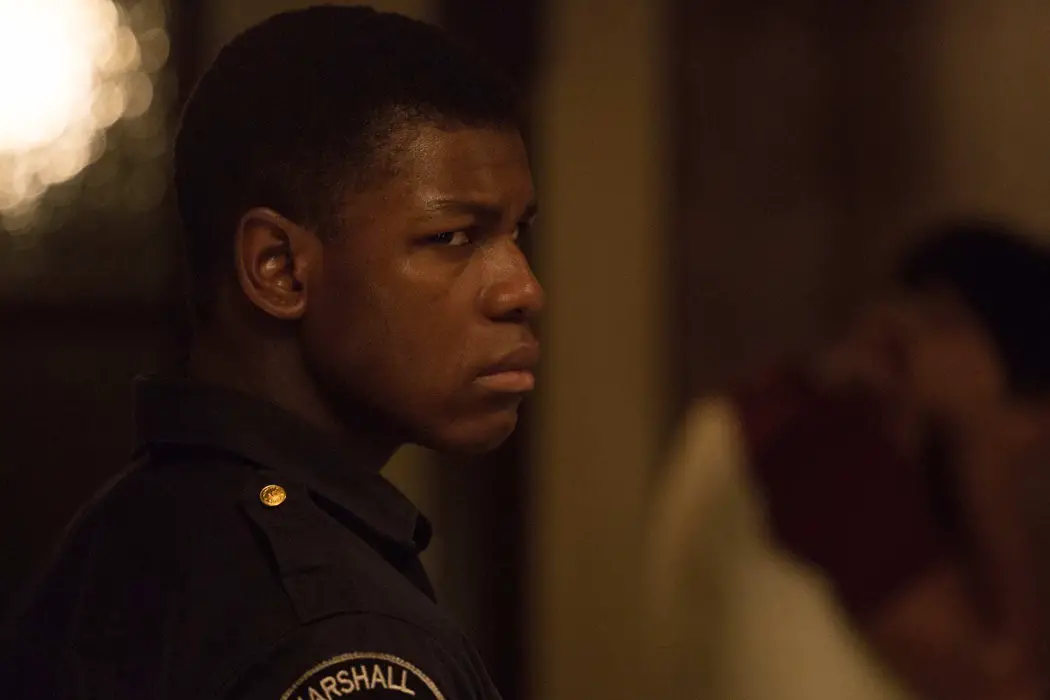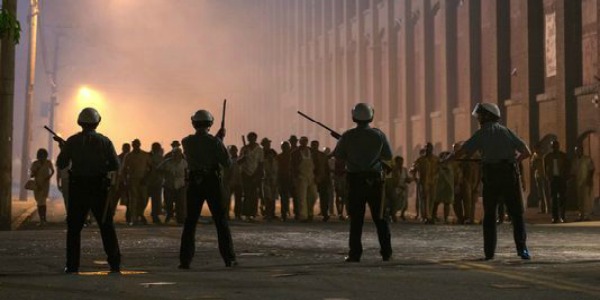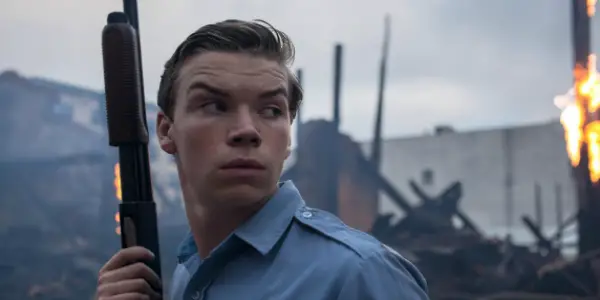DETROIT: A Relevant Riot Rife With Controversy

I'm Alice. I'm a writer, blogger, film nerd, determined dreamer,…
Coming to our screens at a particularly relevant time, John Boyega stars in Detroit; an urgent, angry drama about a blood-thirsty night in US history which continues to resonate down the decades.
Renowned for their award-winning war based collaborations, screenwriter Mark Boal and director Kathryn Bigelow have come together once again to air this dramatisation of the disputed real-life events during the Detroit race riots of 1967.
Two nights after the unrest started, several officers flouted procedure and violently interrogated guests at the Algiers Motel, conducting a death game to intimidate and enforce their confessions, leaving three innocents killed. It’s a powerful thriller that is distinguished by the chilling performance from British actor Will Poulter, as a hateful, racist cop.
At the very core of the movie is a notable night of terror, where a group of white police are investigating a series of gunfire shots that left the bloodied bodies of numerous African-Americans behind. This is a bold choice of subject, that instantaneously suggests the modern-day film is using the tragic turmoil of the past to make a point about the ongoing law-enforcement issues in the current ‘Black Lives Matter’ era – but is this a plus-point of the film itself, or an insult to history?
A Controversial Focus
It has to be acknowledged that Detroit has certainly not landed firmly on its feet due to being awash with a significant bulk of criticism. The controversy surrounding it is perhaps what’s caused it to be one of 2017’s biggest flops – in comparison to many other recent pictures. The film landed its opening weekend in the No. 8 position, wedged between the second weekend of Atomic Blonde and the fourth weekend of War for the Planet of the Apes. Its $7.1 million opening was the lowest this year of any film opening in more than 3,000 theaters; lower even, than Diary of a Wimpy Kid: The Long Haul back in May.

Recently, the film dropped five spots to the No. 13 position, with a 58% dip from the previous week. To date, the movie – which carries a budget estimated between $35-$40 million – has made a profit of just $13.4 million, which is undoubtedly a disappointment when thinking about the promise it had following the initial viewings of the thrilling trailers earlier this year. Not to mention how much this under-performance will damage the premature Best Picture nods it was once receiving from Oscar buffs.
With these thoughts amongst the forefront of its many critique’s, it’s tricky to cast your mind to anything else.
It’s true; Detroit is full to the brim with on and off-screen talent, but it’s the story itself and the way in which it was made that appears to be unsettling some viewers and therefore is preventing them from being fully engaged. Watching Detroit forced a lot of people to realise that there is a severe lack of interest in white perceptions of black related pain and terror. After all, Detroit was directed, written, produced, shot, and edited by white creatives who do not necessarily understand the weight of the images they are honing in on.
It’s 2017, and racial hatred is not exactly a thing of the past. You’ve only got to flick the news on for five minutes to understand how it’s still rife, particularly throughout the USA. So there were bound to be accusations of appropriation tied to this film, but the scale in which it has happened has no doubt come as an unpleasant surprise for its creators.
Another source of the scathing disappointment felt amongst those who saw it, was the all too obvious erasure of black women. Social media was quick to call this out after the trailer release, and this has continued further following the opening of Detroit in cinemas – an understandable reason to disapprove given that the film’s content heavily consists of black actors.
Whilst it might be true that during the specific event that took place in the Algiers Motel didn’t involve any black women, it’s the total absence of their perceptions that are alarming many viewers. Their role and their strength during the riots, the way they nurtured a torn community both before and after the events and their reactions to the tragedies that occurred won’t be found anywhere in this film. It’s the sheer lack of representation which is where the controversy is deriving from. Terrified white girls? Represented. Black women? Not represented.
Sure, the movie was focused on the torture at the motel and that is where the story predominantly lies, but to simply decide that black women’s role in the uprising was nothing more than a mother crying in the hospital is arguably irresponsible. They too, were part of the oppressed. And they too, were part of the movement. But in Detroit, unfortunately, they’re not even part of the backdrop.
It’s clear that instead of helping to start a much-needed dialogue on these race issues, Detroit has massively backfired on its original intentions.
Essential Cinema In The Name Of History
On the other end of the spectrum to these concerns is the necessity to tell this story regardless of who’s telling it. Recent weeks in America have shown how deeply the racial divisions are still felt within the country. Detroit is based on true events from 1967 and makes the prominent point that little has really changed.

Bigelow has fashioned an even-handed yet searingly brutal depiction of events using testimony from those involved as well as genuine footage from the rebellion powerfully blended into Barry Ackroyd’s gritty cinematography.
The way in which Bigelow has approached this is far from conventional or predictable, which needs to be recognised and commended. She has cleverly structured the film in a way that manages to paint the bigger picture, whilst still narrowing the focus to one specific event. After all, she’s an Oscar-winning director with a tour-de-force-style armoury of films like Zero Dark Thirty and The Hurt Locker under her belt. If there was anyone qualified for the job at hand, surely it was her?
It’s a film that lasts an ambitious 140 minutes, and with its fast-paced scare-tactic connotations, Detroit starts to resemble a horror movie. But this isn’t necessarily a bad thing. The night at the Algiers is an ordeal that allows us as an audience to walk in the shoes of the victims and feel what it must be like to be a second-class citizen at the mercy of someone with total power over your life. Will Poulter is the front runner here, with an undeniably brilliant performance as trigger-happy cop, Krauss. He demands attention from the very start, and his baby-face exterior enhances his terrifyingly sick nature even further.
There are no bad performances; and each actor credited here has added their own artistry to the narrative. From Algee Smith to Jacob Latimore, Hannah Murray, Jason Mitchell, Jack Reynor, Kaitlyn Devor and of course, John Boyega; all of whom deserve an enormous pat on the back for ferociously tackling an ominous and unnverving screenplay with such tenacity.

It may be a difficult watch, but it is essential cinema.
Detroit: Final Thoughts
Although assertively criticised by many, I found Detroit to be an eye-opening, courageous piece of film that struck a strong sense of anger within me; which I believe was the moral message Bigelow had envisioned for it. It’s quite simply an expansively harrowing and engaging watch.
At its core, it’s a stand-out picture that expresses another view of a pivotal point of history which shouldn’t ever be ignored; least of all by younger viewers like me who might be unfamiliar or ignorant to the true grit of goings-on like this. I found it to be a vitally bold statement that leaves room for the big questions to be asked. It encourages its audiences to observe the oppressive power structures that are embedded deeply in society, and it suggests that America is on a very long road towards a fully shared recognition of the need for change.
What did you make of Detroit? Let us know in the comments!
Does content like this matter to you?
Become a Member and support film journalism. Unlock access to all of Film Inquiry`s great articles. Join a community of like-minded readers who are passionate about cinema - get access to our private members Network, give back to independent filmmakers, and more.
I'm Alice. I'm a writer, blogger, film nerd, determined dreamer, foodie, vino inhaler and reality TV nut. I have ambitions to become a crazy dog lady in the very near future - www.welcometothelabyrinth.wordpress.com












